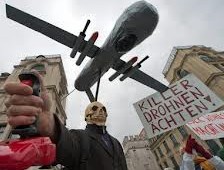
Germany is in uproar. The question whether to procure armed drones for the Bundeswehr is currently dividing the public and the political elite. It all began in August 2012 when German Defence Minister Thomas de Maizière, in an interview with the daily Die Welt [in German], stated his support for the acquisition of armed unmanned aerial vehicles (UAVs or “drones” in popular parlance) for the German Bundeswehr. In the interview, de Maizière argues that the advantages of deploying armed UAVs are clear: “deploying an unmanned drone instead of a manned aircraft serves the security of our soldiers.” “[with UAVs], I can protect soldiers such as tank drivers or pioneers from the air.” [My translation]
The reason behind de Maizière’s public deliberations on this topic is a soon to expire leasing contract between the German Bundeswehr and Israeli Aerospace Industries (IAI). Since 2010, the Bundeswehr has been using three (unarmed) IAI ‘Heron 1’ systems for surveillance purposes in Afghanistan. The leasing contract for these aircraft will expire in 2014, making it necessary for Germany to think about a replacement – armed or unarmed. The debate has been brewing. Two weeks before the interview with de Maizière it had become public that the Bundestag’s defence committee had been reviewing the advantages and disadvantages of procuring armed UAVs for the Bundeswehr.
Following de Maizière’s interview, a number of high-ranking military officials publicly spoke out in favour of armed UAVs. Both the Chief of the Air Force, Air Marshal Karl Müllner, and the Parliamentary Commissioner for the Armed Forces, Hellmut Königshaus, supported de Maizière’s initiative. [Both in German]
In January, the German government then took up a clear stance on the matter. The official response to a question posed by several MPs from Die Linke stated that, “armed UAS[s] […] can engage a target […] quickly, precisely and in a scalable way. Bundeswehr experiences show that a persistent armed ‘over-watch’ in today’s and likely future scenarios of engagement are needed imperatively as protection for sudden grave situational changes” [my translation and emphasis]. This statement put drones at the centre of national interest. Newspaper articles discussing drones’ utility and legality are being published almost on a daily basis; there are panel discussions on TV and radio interviews. Politicians from all parties are weighing in: left-of-centre parties such as Die Linke andBündnis 90/Die Grünen oppose the use of armed drones, while politicians from the centre-right coalition government (CDU/FDP) are (with some exceptions) in favour. The Social-Democrats (SPD), the largest opposition party, are divided. Even representatives from the church have commented [in German], opposing the arms procurement plan. The discussion became so heated that Thomas de Maizière decided to appear in Parliament on 31 January to make a public statement on the matter, reiterating the need to buy armed UAVs: “[Germany] cannot keep the stagecoach while others are developing the railway,” he declared.
The heated discussion, as well as the government’s response is unsurprising. Trying to take such a decision in Germany without the necessary public support would be a very risky endeavour. Since the end of WWII, Germany has defined itself as a ‘civilian power’, implying a reluctance to use military means as well as a desire to strengthening international law, preserving human rights and acting in a multilateral fashion. [See Hanns Maull, “Deutschland als Zivilmacht”, in: Schmidt/Hellmann/Wolf (ed.) Handbuch zur deutschen Außenpolitik, VS Verlag für Sozialwissenschaften, 2007]. To say the least, the German public generally expresses a feeling of unease when it comes to defence policy and anything military. “Defence policy”, a defence expert from the Green Party once declared, “cannot win an election, but it might lose one.” Things might have changed somewhat with the war in Afghanistan. Germany sent more than 3,000 soldiers as a contribution to the ISAF forces, suffering 53 fatalities so far. Nevertheless, defence policy is a difficult topic, as the drone issue clearly demonstrates.
Germany is not the only country having to face the discussion about procuring armed drones. In France, interestingly, it is the government which so far has shied away from asking for the procurement of armed drones and recently took the decision to procure the unarmed ‘Heron TP’. Thereupon, several French Senators sent an open letter to Le Monde, protesting this decision and calling for the acquisition of an armed UAV instead.
What are the German objections? The two major objections brought forward against the procurement of armed drones are that it (1) might make warfare “too easy” and thereby increase the likelihood of wars and (2) that these UAVs could be used for targeted killing campaigns as carried out by the CIA in Pakistan, Yemen and Somalia. [For a good article on the different views on UAVs in Germany see here] The government has tried to refute these claims, especially the second, underlining that German armed drones would only be used in accordance with all rules of engagement and requirements currently applied to operations in Afghanistan.
Such assurances will not be enough to sooth critics. The discussion on the ethics of drone use and the legality of these new weapons will continue. The German discussion promises to stay fierce – and thus particularly interesting. Yet since Germany is not the only country thinking about procuring armed UAVs, it is a national discussion with wider implications.
Ulrike Franke is a DPhil student in International Relations at the University of Oxford.








2 Comments